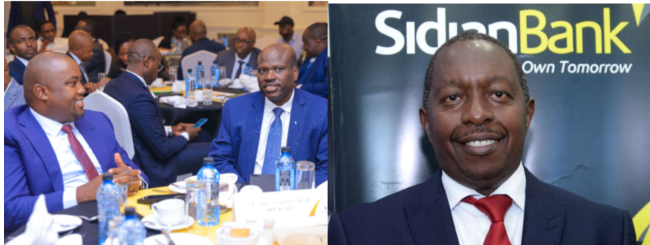The Last Mile Connectivity Project, a flagship initiative of the Kenya Power and Lighting Company (KPLC) supported by the World Bank, has come under intense scrutiny amid accusations of corruption and exploitation.
Designed to provide affordable and accessible electricity to millions across Kenya, the project has been tainted by allegations involving Sidian Bank, high-ranking officials, and questionable procurement practices.
Energy Principal Secretary Alex Wachira, a close associate of Deputy President Rigathi Gachagua, finds himself at the center of these allegations, raising concerns over potential conflicts of interest and the integrity of Kenya’s power sector.
Sidian Bank’s involvement has become controversial, with sources claiming that contractors were compelled to secure financial guarantees exclusively through the bank.
Contractors awarded tenders under the Last Mile Project allegedly faced pressure from Kenya Power officials, particularly John Ng’eno, the procurement manager.
Ng’eno is reported to have demanded substantial “facilitation fees,” purportedly as high as KSh 10 million per contract, from successful bidders.
In one particularly egregious instance, a Chinese contractor’s representative was reportedly detained until an agreement to pay was reached, underscoring the coercive tactics allegedly in play.
This scenario has cast Sidian Bank’s role as a guarantor in a suspicious light, suggesting its involvement may go beyond routine financial services into facilitating what some see as an organized kickback scheme.
Wachira, appointed as Principal Secretary through political connections, allegedly acts as a key player in a broader network of officials closely aligned with Deputy President Gachagua.
He has been implicated not only in KPLC’s procurement issues but also in strategically placing allies in high-ranking positions within Kenya’s energy sector, most notably in Kenya Power and KenGen.
His role has included influence over procurement and appointment decisions, possibly with the intention of benefiting specific individuals and companies.
The allegations extend beyond procurement issues to discriminatory practices. Local contractors report being routinely sidelined in favor of foreign firms, primarily from China, despite meeting the technical and financial requirements outlined in the tender process.
Kenyan contractors have raised concerns over perceived favoritism, leading to appeals to the Public Procurement Administrative Review Board (PPARB), which notably voided a major Last Mile Connectivity tender in 2020 on the grounds of discrimination.
This ruling by PPARB highlighted long-standing concerns over exclusionary practices within KPLC, sparking calls for greater transparency and accountability within the company’s procurement system.
The involvement of Sidian Bank as a preferred financial intermediary has raised eyebrows, not only among contractors but also among donors like the World Bank.
Sidian Bank’s relationship with KPLC, which was established under suspicious terms, effectively binds contractors to a single financial institution.
This arrangement has sparked debate about potential conflicts of interest and the extent to which Sidian Bank may be directly benefiting from coercive tactics used by KPLC officials.
By mandating that contractors secure guarantees through Sidian, KPLC appears to have created a closed financial loop where funds flow through select channels, raising ethical concerns about the bank’s role in the alleged kickback scheme.
These revelations come at a particularly sensitive time for Kenya’s power sector, with the government pledging to expand electricity access to remote and underserved communities.
The Last Mile Connectivity Project is critical in this mission, with the World Bank investing heavily to support Kenya’s universal electrification goals. However, the allegations of corruption and extortion now threaten to overshadow the program’s intended social impact.
According to World Bank documentation, the project received a substantial loan commitment through the International Development Association (IDA) to address infrastructure needs and enhance financial sustainability within KPLC.
Yet, allegations of financial mismanagement and favoritism risk damaging the credibility of the program and undermining international trust in Kenya’s development projects.
Calls for transparency are mounting, with activists, local contractors, and civic organizations urging both the Kenyan government and international donors to investigate the allegations fully.
If proven, these claims could have serious implications for KPLC, potentially resulting in restructuring or increased oversight.
Additionally, as the controversy unfolds, Sidian Bank may face regulatory scrutiny to assess its role in KPLC’s procurement processes and its association with officials implicated in these alleged schemes.
The allegations surrounding Sidian Bank and KPLC have highlighted significant governance issues within Kenya’s energy sector.
For a project meant to uplift millions, the Last Mile Connectivity Project has instead raised questions about the extent to which corruption and unethical practices continue to impede Kenya’s infrastructure ambitions.





















Add Comment